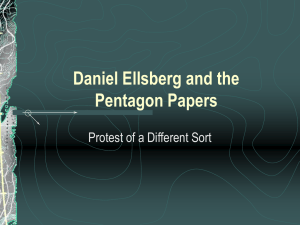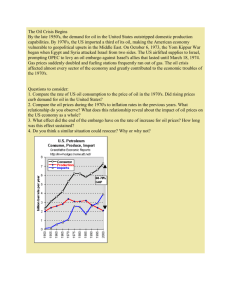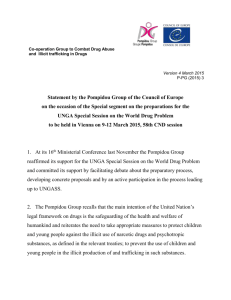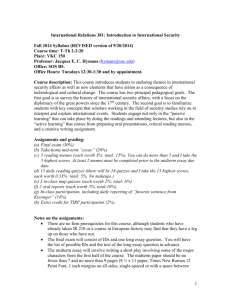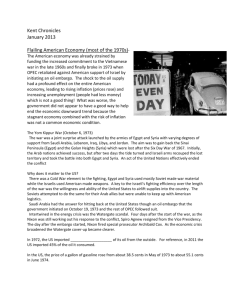Word version
advertisement
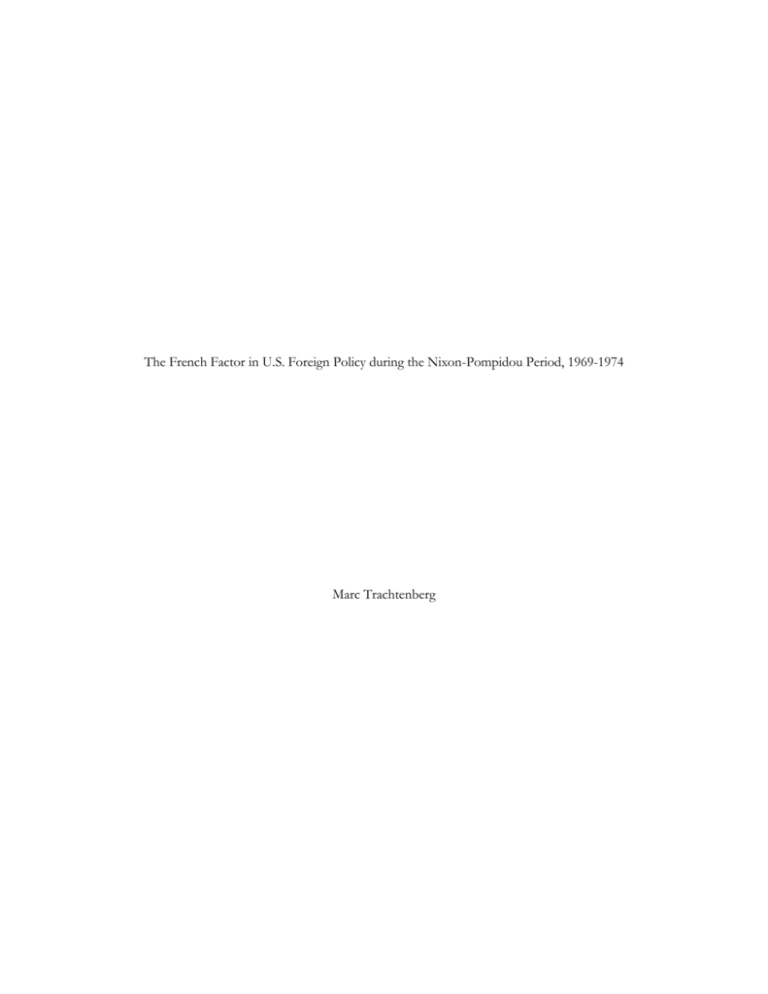
The French Factor in U.S. Foreign Policy during the Nixon-Pompidou Period, 1969-1974 Marc Trachtenberg When Richard Nixon took office as president of the United States in early 1969, he and his national security advisor Henry Kissinger wanted to put America’s relationship with France on an entirely new footing. Relations between the two countries in the 1960s, and especially from early 1963 on, had been far from ideal, and U.S. governments at the time blamed French president Charles de Gaulle for the fact that the United States was on such poor terms with its old ally. But Nixon and Kissinger took a rather different view. They admired de Gaulle and indeed thought of themselves as Gaullists. Like de Gaulle, they thought that America in the past had been too domineering. “The excessive concentration of decision-making in the hands of the senior partner,” as Kissinger put it in a book published in 1965, was not in America’s own interest; it drained the alliance of “long-term political vitality.”1 Nixon took the same line in a meeting with French President Georges Pompidou in February 1970. It was “not healthy,” he said, “to have just two superpowers”; “what we need is a better balance in the West.”2 When Kissinger and Nixon argued along these lines, they were thinking above all of France. And indeed, if they were serious about recasting American policy along these lines, ending what Kissinger later called the “brutish quarrel” with that country was bound to be of fundamental importance.3 France, they thought, was in fact the only major ally that was pursuing a responsible policy of its own. Britain, in comparison, was no longer interested in playing a major role.4 As for A longer and more fully footnoted version of this article, with links to copies to most of the documents cited, is available online at http://www.sscnet.ucla.edu/polisci/faculty/trachtenberg/ffus/FrenchFactor.pdf Henry Kissinger, The Troubled Partnership: A Re-appraisal of the Atlantic Alliance (New York: McGraw Hill, 1965), p. 233. 1 Nixon-Pompidou meeting, February 24, 1970, p. 6, Digital National Security Archive [DNSA], Kissinger Transcripts collection [KT], document KT00103. 2 3 Henry Kissinger, Years of Upheaval (Boston: Little, Brown, 1982), p. 5. 4 Henry Kissinger, White House Years (Boston: Little, Brown, 1979), p. 421. 2 Germany, both Nixon and Kissinger were worried about the Federal Republic, and especially about where the policy of the new Willy Brandt government—its Ostpolitik, its policy of improving relations with the East—was leading. They knew they had to go along with that policy, at least for the time being. But they were worried about German nationalism and German neutralism, about the Germans’ interest in eventually doing away with NATO, about the possibility that people like Brandt were setting off a process they would not be able to control. This meant that the United States could not have the same sort of relationship with Germany that Nixon and Kissinger hoped to have with France: Germany was viewed more as a problem than as a partner. Kissinger laid out his basic views in a meeting with Pompidou in May 1973. A strong Europe, he said, was as essential as a strong China, and in that strong Europe, “France would play a pivotal role. We do not believe that Germany is sufficiently strong psychologically, and we believe it is too open to Soviet pressures to be able to contribute to develop a Europe in this sense.”5 Those attitudes would have had a major impact on relations between the two countries even if de Gaulle had remained in power. As it was, the French for their part had also shifted course in 1969. Pompidou, who also came to power that year, was a Gaullist but he was not de Gaulle. His was a “rationalized Gaullism,” as Georges-Henri Soutou calls it, a Gaullism shorn of the General’s eccentricities. The new president did not want to see the United States play only a peripheral role in European affairs. There needed to be a counterweight to Soviet power in Europe, and in his view only the United States could provide it. On that issue he and the new American leadership saw eyeto-eye. And on the other great issue in European politics, the German question, they also took basically same line. Neither of them was entirely thrilled by what Brandt was doing, but for now at least neither would stand in his way.6 5 Kissinger-Pompidou meeting, May 18, 1973, p. 7, DNSA/KT00728. On the Pompidou policy, see Georges-Henri Soutou, “L’attitude de Georges Pompidou face à l’Allemagne,” in Association Georges Pompidou, Georges Pompidou et l’Europe: Colloque, 25 et 26 novembre 1993 (Brussels: Editions Complexe, 1995); and idem, “La problématique de la Détente et le testament stratégique de Georges Pompidou,” Cahiers du Centre d’Études d’Histoire de la Defense, cahier no. 22 (2004). 6 3 Given all this, it would have been amazing if relations between the two countries did not improve dramatically, and in fact in the early Nixon-Pompidou period the two governments were on very good terms. Kissinger, in his memoirs, referred to a “degree of sharing of views unprecedented among allies,” and some of his meetings with Pompidou were indeed quite extraordinary.7 But what was going on in the nuclear area was of even greater importance.8 From the very start, both governments were interested in developing a certain relationship in this area.9 Nixon and Kissinger wanted to support the French nuclear program. As Kissinger told the French ambassador in April 1973, de Gaulle “was basically right,” it was “too dangerous to have one country as the repository of nuclear weapons. We would like France to be a possessor.”10 And as for Pompidou, he very much wanted to get American help for the French nuclear program. So it is not too surprising that a certain relationship did develop. The Americans began to provide some very important information relating especially to France’s existing systems, especially information that would help French missiles penetrate Soviet defenses. The French, for their part, were quite pleased with the information the Americans were giving them.11 So American policy toward France had shifted in a fairly fundamental way, and what that suggests is that the language the new U.S. leadership was now using has to be taken seriously. 7 Kissinger, White House Years, p. 964. On this issue, see especially Pierre Mélandri, “Aux origines de la coopération nucléaire franco-américaine,” in Maurice Vaïsse, ed., La France et l’atome: études d’histoire nucléaire (Brussels: Bruyant, 1994); Pierre Mélandri, “Une relation très spéciale: la France, les États-Unis et l’Année de l’Europe,” in Georges Pompidou et l’Europe, esp. pp. 106-110; Soutou, “La problématique de la Détente,” esp. pp. 91-92, 97-98, and above all Maurice Vaïsse, “Les ‘relations spéciales’ franco-américaines au temps de Richard Nixon et Georges Pompidou,” Relations internationales, no. 119 (Fall 2004) 8 See Vaïsse, “Les ‘relations spéciales’ franco-américaines,” p. 360, and also the discussion on p. 3 of the more extensive manuscript version of this article (provided to me by Professor Vaïsse). 9 10 Kissinger meeting with Ambassador Jacques Kosciusko-Morizet, April 13, 1973, p. 9, DNSA/KT00702. See Defense Minister Debré to Pompidou, March 11, 1972, quoted in Mélandri, “Une relation très spéciale,” p. 107. 11 4 But if all this is true, how then are we to understand what happened in the final year of the Nixon-Pompidou period? For in 1973, relations between the two countries took a sharp turn for the worse. What went wrong? The problem, it turns out, was not really rooted in what was going on in the economic sphere. The two governments did have very different views especially about the reform of the international monetary system, but in the final analysis that sort of issue was not of fundamental political importance. Pompidou himself saw “no great difficulty concerning economic relations between the U.S. and the European Community.”12 The real problem lay elsewhere. The Year of Europe On April 23, 1973, Henry Kissinger gave a major speech called “The Year of Europe.” The Atlantic alliance, he argued, was in trouble. The United States was a global power, whereas the Europeans had essentially “regional interests.” The time had come to deal with the tensions this situation had given rise to, and indeed to deal with them comprehensively. “The political, military, and economic issues in Atlantic relations,” he said, “are linked by reality, not by our choice nor for the tactical purpose of trading one off against the other.” Those issues had to be “addressed at the highest level.” In 1972, Nixon had transformed America’s relationship with her two Cold War adversaries, the Soviet Union and China. In 1973, the main goal would be to reinvigorate the western alliance by working out a “new Atlantic charter,” a “blueprint” for a “revitalized Atlantic partnership.”13 The Europeans, and especially the French, did not respond the way Kissinger had hoped. The Americans, it seemed, were trying to group the allies around the United States. Their goal was to set policy for the alliance as a whole. The sort of system they were trying to create, Pompidou 12 Pompidou-Nixon meeting, May 31, 1973, 10 a.m., p. 8, DNSA/KT00742. “The Year of Europe,” address by Henry Kissinger in New York, April 23, 1973, Department of State Bulletin, May 14, 1973, pp. 593-598. 13 5 himself later said, implied a “certain subordination” of the allies to the United States.14 Michel Jobert, the foreign minister, used stronger language. Kissinger’s geopolitical vision, he wrote, was quite clear: the whole world would revolve around American power; Europe would be “confined to a purely regional role”; the process the Americans hoped to begin would “consecrate American hegemony over the western world.” 15 It was not clear at first that the official French reaction would be so negative. Kissinger had explained the initiative to the French ambassador, Jacques Kosciusko-Morizet, on March 19; the ambassador then flew to Paris to brief the head of state in person. “Yes, I agree,” Pompidou said, giving what Kosciusko called the “green light” for the Year of Europe speech.16 And when Kissinger met with Pompidou on May 18, the French president did not seem at all hostile. He was “not particularly shocked” by the much-criticized passage in the speech that referred to the Europeans’ “regional” interests. And he agreed that while it was necessary to consider each specific problem “in its own context” it was also important to keep the broader picture in mind “on all occasions.” “If some were shocked by your ideas,” he told Kissinger, “I personally did not find your ideas so far from reality.”17 Pompidou was the key to the whole Year of Europe plan, and as Kissinger saw it, the main goal of the Nixon-Pompidou meeting that was scheduled to begin in Reykjavik at the end of May was to set the whole process of drafting a new Atlantic charter in motion. It therefore came as something of a shock to him, after a long late-night talk with Jobert shortly after his arrival in Iceland, that “the French clearly harbor the most deep-seated suspicions of our motives in launching 14 See Mélandri, “Une relation très spéciale,” p. 97. 15 Michel Jobert, Mémoires d’avenir (Paris: Grasset, 1974), pp. 231-232. 16 Kosciusko-Morizet comment in Georges Pompidou et l’Europe, p. 209. 17 Kissinger-Pompidou meeting, May 18, 1973, pp. 1-2, DNSA/KT00728. 6 our Atlantic initiative.18 It had to be made clear to them what America’s real goals were. “They think we are aiming at a perpetuation of U.S. hegemony,” he told the president a few days before the conference. “This is not our objective at all.”19 He had taken the same line in a meeting with Kosciusko on May 14. It made no sense, he said, for someone like him who admired de Gaulle to want to “return to the Kennedy period, and the same for the President. . . . We don’t disagree with your views.” The U.S. government certainly did not intend, he said, “to create one undifferentiated Atlantic Community in which the Europeans have to follow Washington directly.” The passage in his speech about the regional role of Europe had been taken entirely out of context. If Europe wanted to play a global role, America would welcome it. And as for the argument that by linking economic, political and military issues the Americans were trying to “blackmail” Europe—that is, that they were implicitly threatening the Europeans that the security relationship would be put at risk if they did not give way on economic matters—this too, Kissinger said, was based on a misunderstanding. If the United States wanted to play hardball, the political leadership would simply leave the economic negotiations to the economic agencies. Putting them in a political framework would lead to a more conciliatory U.S. stance. But the basic point was that America was not pursuing a hostile or confrontational policy. He wanted to pursue the initiative together with the French. “We believe in a strong France,” he said; in particular, the U.S. leaders “would be prepared to listen to your ideas in the nuclear field.”20 Kissinger and Nixon hammered away on these points in subsequent meetings with Jobert and Pompidou. Kissinger’s May 18 meeting with Pompidou was particularly important, because once again he linked the basic concept to the U.S. policy of helping the French nuclear program: Kissinger to Nixon, May 30, 1973, National Security Council Files [NSCF], box 949, folder “PompidouNixon Meeting, May June 1973, 1 of 3, Nixon Presidential Materials [NPM], U.S. National Archives [USNA], College Park, Maryland. 18 19 Kissinger meeting with Nixon et al., May 25, 1973, DNSA/KT00738. 20 Kissinger-Kosciusko-Morizet meeting, May 14, 1973, pp. 2-3, DNSA/KT00723. 7 We do not seek to dominate Europe, on the contrary. We want a strong Europe. We have always supported the European nuclear effort. As I recently told your Ambassador, we are not pushing but we are ready to discuss with you, either directly or if you prefer through the British, what we could do to strengthen your military capacity. The fact that the United States was willing to move forward with its policy of helping the French nuclear program proved that these assurances about U.S. policy were not to be dismissed as mere words—this, it seems, was what Kissinger was now suggesting.21 The Americans, in fact, were now ready to deepen the nuclear relationship with France. Nixon and Pompidou agreed at Reykjavik to move the discussion into a new area, the “holy of holies,” as Soutou puts it, the design of the nuclear cores themselves.22 Kissinger had made it clear in April, even before he gave the Year of Europe speech, that he was prepared to do more for the French nuclear weapons program.23 And after Reykjavik, he seemed determined to proceed with that policy. “Some of our experts,” he told Jobert on June 8, “think you don’t appreciate the characteristics of Soviet defenses. If you wanted, you could send quietly some of your technical experts to Washington, so our experts could explain this and how you could deal with it. Warhead design, and some suggestions. Without changing your program.”24 But the French were not convinced by Kissinger’s arguments about the meaning of the Year of Europe initiative, and even the prospect of a much closer nuclear relationship did not induce them to go along with the Kissinger policy. At Reykjavik, it seemed that Pompidou might be willing to cooperate. He and Nixon agreed on a procedure, more or less. Kissinger would meet with his French, British and German counterparts, but not as a group; eventually the deputy foreign ministers of all the allied countries would meet to see if some statement of principles could be 21 Kissinger-Pompidou meeting, May 18, 1973, p. 7, DNSA/KT00728. 22 Soutou, “La problématique de la Détente,” p. 97. 23 Kissinger-Kosciusko-Morizet meeting, April 13, 1973, pp. 8-9, DNSA/KT00702. 24 Kissinger-Jobert meeting, June 8, 1973, p. 17, DNSA/KT00748. 8 worked out.25 But then in July the procedure was changed. The Europeans announced (in Kissinger’s words as the time) that “they planned to get together as the Nine to prepare their response and that in the meantime they would not communicate with the U.S.”26 When the E.C. had drafted the plan, it would be presented to the United States by the Danish foreign minister, but he was “only a messenger.” He could not negotiate on behalf of Europe as a whole. The whole situation, as Kissinger saw it, was absurd: “the countries who can negotiate with us won’t talk and those who can talk with us can’t negotiate.”27 The Americans felt they were being given the runaround. Kissinger was bitter. It was clear that the Europeans, and especially the French, had no interest in cooperating with the United States in this area. To one extent or another, they were hostile to the whole Year of Europe idea. It was particularly galling to him that they were not even willing to use the word “partnership” in the declaration.28 The initiative was supposed to improve America’s relationship with Europe, but it had been “turned almost into a EuropeanAmerican confrontation.”29 As a result, no matter what draft was eventually worked out the “emotional content” had been “drained from the declaration exercise.”30 But then again that showed how foolish it had been (as he himself later admitted) to try to “base foreign policy on an abstract quest for psychological fulfillment.”31 So what is to be made of the whole Year of Europe affair? Looking back, the whole episode comes across as a little bizarre. There were certainly serious problems in the U.S.-European Nixon-Pompidou meeting, May 31, 1973, 10 a.m., pp. 7, 10, 12-13, DNSA/KT00742, and Nixon-Pompdou meeting, May 31, 1973, 3 p.m., pp. 3-4, DNSA/KT00743. 25 26 Kissinger meeting with Rusk, Bundy, McCloy, et al., November 28, 1973, p. 5, DNSA/KT00928. 27 Ibid. 28 Ibid., p. 7. 29 Nixon to Brandt (drafted by Kissinger), July 30, 1973, Kissinger, Years of Upheaval, p. 191. 30 Kissinger meeting with Rusk, Bundy, McCloy, et al., November 28, 1973, pp. 5, 7, DNSA/KT00928. 31 Kissinger, White House Years, p. 381. 9 relationship, but could you really deal with them by drafting a declaration of principles? It is hard to see, in fact, how a declaration of this sort, which was bound to be full of platitudes and generalities, would change anything of substance. On the other hand, the plan for a “new Atlantic charter” was essentially harmless, and the only thing that made the episode important politically was the fact that the Europeans, led by the French, opposed it. A mere declaration would change nothing of substance. If America wanted to pursue a “linkage” policy—if the U.S. government wanted to force the Europeans to make concessions in the economic area by making it clear that the security relationship was at risk—it would scarcely need a formal “charter” to do so. It is thus hard to understand why the French reacted as negatively as they did. Looking back, Kissinger was puzzled by the fact that “we found ourselves embroiled with France in the same sort of nasty confrontation for which we had criticized our predecessors.”32 He blamed Jobert for the conflict. He thought the French foreign minister was pursuing “the old Gaullist dream of building Europe on an anti-American basis.”33 But Pompidou was calling the shots on the French side, and although Pompidou certainly felt that Europe needed to develop an identity of their own, he also felt that the Europeans had to proceed cautiously. It was not wise, in his view, to alienate America unnecessarily as Europe was being built.34 And he certainly understood that for the time being Europe, as a unified political entity, did not really count for much: the European Community, as he told Nixon in May 1973, had “no political reality,” it was “only an economic reality.” And he was prepared to live with that situation: “But Europe is what it is; there is nothing we can do about it.”35 Yet even as Pompidou uttered those words his attitude was shifting. He was beginning to take a more “European” line, a line that suggested that the Europeans should come together by 32 Kissinger, Years of Upheaval, p. 163. 33 Ibid., p. 165. 34 See Éric Roussel, Georges Pompidou, 1911-1974, new edition (Paris: J.C. Lattès, 1994), p. 650. 35 Pompidou-Nixon meeting, May 31, 1973, 10 a.m., pp. 5-6, 8, DNSA/KT00742. 10 pursuing their own policy, a policy that differed from that of the United States, almost as an end itself. Why the shift in policy? It was not that Pompidou’s basic feelings about “building Europe” had suddenly changed. The real taproot lay elsewhere. The United States was now dealing directly and seriously with the Soviet Union, and it was very natural to worry about where that process might lead. Were the two superpowers going to settle major issues, including European issues, by themselves, over the heads of the Europeans? It was obvious, he thought, that the U.S.-Soviet rapprochement might be at Europe’s expense. Given the kinds of negotiations that were either going on and were planned—the Strategic Arms Limitation talks [SALT], the Mutual and Balanced Force Reduction talks [MBFR], the talks leading to the U.S.-Soviet agreement on preventing nuclear war [PNW]—this was a major source of concern. Pompidou and his top advisors were increasingly worried about the prospect of a U.S.-Soviet “condominium”—of America and Russia becoming too intimate with each other, and of the Europeans being eclipsed. The Year of Europe project was seen in that context. The condominium idea implied that each superpower would dominate its own bloc; the proposal for a more solid western alliance, it seemed, might well be rooted in this kind of thinking. Over and over again, Kissinger and Nixon denied, as explicitly as they could, that their goal was to bring about a world of this sort. From their point of view, the whole argument that the Year of Europe initiative was to be understood in such terms made little sense. If the United States wanted to deal with the Soviet Union à deux, it would just do so. If their policy was to ignore the Europeans, why were they trying so hard to develop a stronger relationship with the European allies, and especially with France? Kissinger, in fact, went to great lengths to explain what the United States was up to in some of the areas that most concerned the French, especially the PNW agreement and MBFR. In his extraordinary May 18, 1973, meeting with Pompidou, Kissinger explained in some detail how the PNW agreement fit into America’s larger foreign policy. The détente policy, he said, should not be misunderstood. The United States was not opting for the Soviet Union over China. The Americans, 11 in fact, were interested in “playing China against the Soviet Union.” But for the time being no one would believe that America would support China in her conflict with the USSR in any really serious way: “We need several years to establish with China the links which make plausible the notion that an attack directed against China could be an attack on the fundamental interests of the United States.” But as America’s relationship with China deepened, it was “nevertheless important that this movement not serve as a pretext for a Soviet attack against China.” During that period, it was important that U.S. policy "not seem to be directed against the Soviet Union.” It was thus important that the détente policy be “carried on in parallel with the Soviet Union.” American policy in the PNW affair was to be understood in this context. The aim was “to gain time, to paralyze the Soviet Union.” The Americans were not capitulating to the Soviets. They were trying “to enmesh them,” and it was “absolutely essential” that Pompidou understand what the Americans were up to.36 The U.S. government also tried to explain to the French why they should not be troubled by what the Americans were doing on the force reduction issue. The French did not like the idea of an MBFR agreement. It implied that central Europe would have a special military status, and this was viewed as a step toward the neutralization of that area. Pompidou, moreover, did not want a reduction of the U.S. troop presence in Europe. But again U.S. leaders explained what American policy in this area really was. As Nixon told Pompidou at Reykjavik, neither of them really wanted an MBFR agreement, but the talks had an important domestic political function: “I keep dangling this in front of Congress to keep them from cutting funds” for the U.S. troops in Europe.37 Those explanations and assurances did not have the desired effect. In France, the fear of an emerging U.S.-Soviet “condominium” remained very much alive. But even if those concerns were warranted, there was more than one way to deal with them. One might, for example, have expected the French to press for greater political intimacy with the United States so that France and the other European countries would not be marginalized. And some key French officials agreed with the 36 Kissinger-Pompidou meeting, May 18, 1973, pp. 4-6, DNSA/KT00728. 37 Nixon-Pompidou meeting, May 31, 1973, p. 10, DNSA/KT00742. 12 Americans that the two sides needed to engage in a serious dialogue.38 But Pompidou chose to move in the opposite direction, toward a policy with a sharper anti-American edge. That choice was probably rooted in a visceral sense that increased self-assertiveness was the only real answer to the “condominium” problem. So French policy shifted in mid-1973 and the Americans were not slow to react. The most striking change was in the nuclear area. It seemed in the summer that American assistance to France would be stepped up; the French armed forces minister, Robert Galley, came over for talks in late July and again in late August. But by then the American attitude had cooled. “What we want,” Kissinger told Secretary of Defense James Schlesinger on August 9, “is something which makes Galley drool but doesn’t give him anything but something to study for a while.”39 And a month later he told Schlesinger not to “conclude anything with Galley in September.” He wanted to go slow for political reasons. He now thought he could get something in exchange for the nuclear assistance he was prepared to give France: “The real quid pro quo is the basic orientation of French policy. Galley said he understood but it would take them time.”40 But Pompidou obviously was not going to give way on something that basic, and the U.S. government, for its part, was no longer willing to deepen the nuclear relationship with France. “The Americans don’t want to give us anything any more,” Pompidou told Michel Debré in February 1974.41 But the nuclear relationship had effectively been put on hold months earlier, in September 1973. The collapse of that relationship thus has to be understood in political terms. It did not end because the Americans wanted to learn too much about what the French were doing in the nuclear area—it did not end, that is, because the Americans in the final analysis were insisting on terms that See, for example, Jean-Bernard Raimond note for Pompidou, May 10, 1973, cited in Soutou, “La problématique de la Détente,” p. 96. 38 Kissinger-Schlesinger meeting, August 9, 1973, Declassified Documents Reference System, doc. CK3100568969. 39 40 Kissinger-Schlesinger meeting, September 5, 1973, p. 1, DNSA/KT00800. 41 Michel Debré, Entretiens avec Georges Pompidou 1971-1974 (Paris: Albin Michel, 1996), p. 210. 13 would compromise French nuclear independence. It is quite clear, in fact, that the Pompidou government did not feel it had to keep the Americans in the dark in this area as a matter of principle.42 Even in the area of what Soutou calls the “software”—that is, the basic thinking and planning about how nuclear weapons would actually be used—the French government was more willing to work with the Americans than one might have thought.43 But the nuclear relationship, as important as it was, could not exist in a vacuum, and as political relations deteriorated, a strong defense relationship could scarcely be sustained. The problem, as a U.S. diplomat in Paris put it at the time, was that the French government “regards us as a partner in defense only, while in all other matters the E.C. and the U.S. are to interact as separate, independent entities.”44 But an arrangement of that sort the U.S. government was simply unwilling to accept. So by September 1973 the nuclear relationship had been put on hold. And the date here is quite significant. It means that political relations had taken a sharp turn for the worse even before war broke out in the Middle East in October 1973. The Mideast War and Its Aftermath In October 1973, war broke out between Israel and the Arab countries. The Americans supported Israel (within limits), and the Soviets supported the Arabs, at one point threatening to intervene unilaterally—a threat that led directly to the famous American nuclear alert of October 24. If a nuclear war broke out, NATO Europe could obviously not stand on the sidelines, but the U.S. government had not consulted with its allies before ordering the alert. And the Europeans basically did not agree with the United States on the Arab-Israeli issue. They generally took a more pro-Arab 42 See, for example, Laird to Kissinger, July 29, 1971, DNSA/PR00608. See especially Irwin to Kissinger, Rush and Schlesinger, September 21, 1973; Rush-Galley conversation, September 25, 1973 (document dated Sept. 26); and Irwin to Kissinger, October 8, 1973; all in Department of State Central Foreign Policy Files, Electronic Telegrams (1973), RG 59, USNA, retrieved from the National Archives’ Access to Archival Databases [AAD] website for that file (http://aad.archives.gov/aad/serieslist.jsp?cat=WR43), doc. nos. 1973PARIS24957, 1973STATE191313, and 1973PARIS26222. 43 44 Stone to Stoessel, November 29, 1973, AAD website, doc. no. 1973PARIS30642. 14 line, in large part, as they themselves freely admitted, because of their much greater dependence on Arab oil. The Arabs, in fact, were now openly using oil as a political weapon. So as the war ran its course, the Europeans by and large sought to distance themselves from the United States. They refused to cooperate with American efforts to resupply Israel from U.S. stocks in Europe. They would not permit U.S. transport planes to overfly their territory—even though the Soviets were allowed (as Kissinger notes) to use NATO airspace “without challenge.”45 The Europeans, of course, had their own grievances. They complained above all about inadequate consultation, but “the real trouble,” as Kissinger later pointed out, “was a clash in political perspectives that no amount of consultation” would have been able to remove.46 He also felt that there was something disingenuous about that complaint. The United States, as he told the German ambassador on October 26, had in the past tried repeatedly to consult with the allies and “work out common positions,” but the Europeans had not been interested. On the Arab-Israeli question in particular, they had instead chosen to dissociate themselves from America and pursue policies of their own. In such circumstances, he said, “when their fundamental attitude was either slightly or openly hostile,” they were hardly in a position to “insist on a right to private briefings.”47 But Kissinger did not dismiss the European case in this general area as frivolous. A serious argument could certainly be made that America had been too passive before the war, that the U.S. government needed to force the Israelis to withdraw from the areas they had occupied in 1967, and that a comprehensive peace had to be the goal. The U.S. view was different: even a full Israeli withdrawal would not necessarily lead to peace; to tilt toward the Arab side, to give way to Arab oil power, would strengthen the radicals within the Arab camp; the situation was such that a 45 Kissinger, Years of Upheaval, p. 709. 46 Ibid., p. 720. Kissinger-von Staden meeting, October 26, 1973 (doc. dated Oct. 27), National Security Archive Electronic Briefing Book No. 98, “The October War and U.S. Policy,” doc. no. 81, pp. 4, 6. 47 15 comprehensive peace was unachievable in the near future, and a more modest step-by-step approach was in order. The Americans had a strategy. The key thing was to capitalize on Israeli dependence on the United States. That meant that the Arabs would have to deal with the United States since only the Americans could influence Israeli policy. The U.S. government could take advantage of that position to build a relationship with the Arab moderates and to marginalize the radicals within the Arab world (and their Soviet supporters). To do that, it would have to show that moderation paid off and that bit by bit a reasonable accommodation could be worked out. And as the Arabs moved toward a reasonable policy, the Israelis would also become more accommodating—or could more easily be pushed in that direction. In pursuing this sort of strategy, there was some hope that a settlement of this almost intractable conflict could eventually be worked out. The Europeans, of course, saw things differently, but for Kissinger at this point the issue was no longer who could make the better case. Even if the Europeans had been right about American policy before the war, it made little sense for them to try to sabotage American policy now. They had no viable alternative strategy that they were capable of pursuing themselves. To undercut what the U.S. government was doing—to encourage the Arab radicals, to give them the sense that they, and not the Americans, were in the driver’s seat—could not, in his view, be in the interest of the West as a whole.48 And indeed one would not have expected the Europeans, and especially the French, to have opposed the Americans in this area as strongly as they did. On the core issue the two sides were not that far apart. All the major European countries were committed to the survival of Israel, while the Americans, for their part, did not intend to give the Israelis a blank check. As Kissinger told Pompidou in December 1973, the Israelis had “a diplomacy which leads to suicide.”49 The implication was that basic Israeli policy had to change. The argument was thus over strategy, not 48 Kissinger, Years of Upheaval, pp. 707-708, 711, 716. 49 Kissinger-Pompidou meeting, December 20, 1973, p. 4, DNSA/KT00968. 16 fundamentals. In such circumstances one might have thought that given the basic realities of the situation, the Europeans would not try to sabotage American policy. And yet that, as Kissinger saw it, was precisely what they did. “Europe, it emerged increasingly,” he said, “wanted the option to conduct a policy separate from the United States and in the case of the Middle East objectively in conflict with us.”50 This was something the U.S. government could not accept. Did the Europeans really think they could pursue a totally independent and indeed anti-American policy and still expect the United States to defend them? Did anyone really think that “America should be accorded the great privilege of defending Europe, but have no other role” in European affairs?51 It had to be made clear to the main European governments that the line they were taking on the Arab-Israeli question was putting their alliance with America at risk. They had to be made to “recognize the abyss before which they stand.”52 The whole problem, Kissinger was coming to think, could no longer be swept under the rug. America needed to have it out with the European allies. The Europeans were “craven,” they were appeasers; when one saw the intelligence reports “of what the U.K. and the French are saying to the Arabs, it is worse than it was in the thirties.”53 “We are aware of French approaches in Arab capitals,” he told the French ambassador on December 3, “and our reports suggest that your position has been critical of the United States. I see no reason under these conditions for a cooperative relationship.”54 50 Kissinger, Years of Upheaval, p. 716. 51 Kissinger-Kosciusko-Morizet meeting, December 3, 1973, p. 2, DNSA/KT00932. 52 Kissinger meeting with Rusk, Bundy, McCloy, et al., November 28, 1973, pp. 29, 31, DNSA/KT00928. Ibid., p. 23, DNSA/KT00928; Kissinger quoted in C.L. Sulzberger, “United States and France: I,” New York Times, March 16, 1974, p. 31. 53 54 Kissinger-Kosciusko-Morizet meeting, December 3, 1973, p. 3, DNSA/KT00932. 17 The issue, in Kissinger’s view, could not be allowed to fester. He was increasingly inclined to “bring matters to a head” with the Europeans, and especially with the French.55 In January 1974, the main oil importing countries were invited to a conference in Washington. The goal was to organize the oil purchasers, but the Europeans were afraid that the oil producers, who of course had an active cartel-like organization of their own, would find the notion provocative. The French were particularly hostile to the plan. But the U.S. government wanted a showdown. If the plan for energy cooperation did not work, Kissinger told John McCloy, the Americans would “have to take on the French in an all-out confrontation.”56 As it turned out, the French were isolated in Washington. The other main consumer countries succumbed to U.S. pressure and supported the American proposal to set up an international energy agency. But a month later there was a new confrontation. In early March, the European Community met in Brussels and adopted a plan for a European-Arab dialogue, to culminate in a foreign ministers’ meeting—a move taken without consultation with the United States, and indeed after assurances had been given that the “dialogue” would be a more low-key affair.57 Kissinger was livid. “We were determined to draw the line,” he later wrote. What had happened was unacceptable. “We now had divergent policies in areas we considered vital.”58 France was the main target of his wrath. The French, Kissinger told his advisors, were “organically hostile to the US and now clearly constitute the greatest global opposition to US foreign policy.”59 In a meeting with Kosciusko in late March, just a few days before Pompidou’s death, he laid out his grievances in considerable detail. The bottom line was quite simple: “The Alliance is basic to our 55 Kissinger, Years of Upheaval, p. 901. Kissinger phone conversation with John McCloy, February 8, 1974, 11:10 a.m., U.S. Department of State Electronic Reading Room, Kissinger Transcripts series [DOS ERR/KT]. 56 57 See Kissinger-Scheel meeting, March 3, 1974, p. 7, DNSA/KT01052. 58 Kissinger, Years of Upheaval, pp. 930-931. Kissinger meeting with key advisors, March 11, 1974, p. 4, Sonnenfeldt Papers/4/HS Chron – Official – JanApr 1974/RG 59/USNA. 59 18 policy but the American defense of Europe cannot continue so that Europe is free to pursue antiAmerican policies.”60 By that point, French policy had also hardened. The dying president laid out his views in an important document, his “strategic testament” of February 1, 1974. “When our core interests are at stake,” Pompidou wrote, “we must never give way or pull back. Being isolated does not matter, threats and pressures do not matter, France must never give in to anyone, even the most powerful. When the national interest is at stake, it is necessary to display an iron will.”61 The time had come, in other words, to stand up to America—to return, that is, to a purer more orthodox Gaullist political line. On February 1, the very day it was signed, Pompidou showed a copy of the document to the arch-Gaullist Michel Debré: “Vous voyez, Michel, je ne trahis pas la France!”62 Making Sense of the Story So by the end of the Nixon-Pompidou period the relationship which had begun so promisingly in 1969 lay in pieces on the floor. Kissinger was totally baffled by what had happened after mid-1973.63 “What,” he wondered, “have we done to these people?”64 From his point of view, he and Nixon had from the start practically bent over backwards to build a strong relationship with France. They had “always believed,” he told the French ambassador on March 22, 1974, “that Europe must be organized around France.” “The confrontation which has come about,” he said, was “certainly not by our choice.” “The French,” he said, were “the aggressors in this situation.”65 60 Kissinger-Kosciusko-Morizet meeting, March 22, 1974, p. 10, DNSA/KT01080. Quoted in Jean de Lipkowski, “Succéder au Général,” in Bernard Pons et al., Georges Pompidou: vingt ans après (Paris: Table Ronde, 1994), pp. 114-115. 61 62 Debré, Entretiens avec Georges Pompidou, p. 209. 63 Kissinger-Sauvagnargues meeting, July 4, 1974, DNSA/KT01240. 64 Nixon-Kissinger telephone conversation, February 11, 1974 (6:30 p.m.), DOS ERR/KT. 65 Kissinger-Kosciusko-Morizet meeting, March 22, 1974, pp. 8, 14, DNSA/KT01080. 19 So what had gone wrong? Were the policies the two governments pursued simply incompatible—that the French sought to develop a distinct European identity, while the Americans were out to reaffirm their own “leadership” within the Atlantic alliance? Pompidou certainly wanted Europe to develop a greater degree of political cohesion and independence, but his basic inclination was to proceed slowly and carefully and without putting what he saw as Europe’s vital security relationship with America at risk. And in principle the Americans were willing to go along with a policy of that sort. But as U.S. leaders saw it, there were limits beyond which the Europeans could not go. Indeed, the basic U.S. view from 1961 on was that the western European countries were in the final analysis dependent on America for their security, and that in such circumstances they could not pursue totally independent foreign policies. If they wanted American protection, they could not oppose U.S. policy in any fundamental way. Does this mean that the French were right in thinking that the U.S. goal in pressing for a “revitalized” alliance was to create a system in which the policies of the European governments would be subject to American control ? Kissinger and Nixon clearly wanted the main western allies to work out what amounted to a common policy, but that does not in itself mean that they thought the U.S. government would essentially determine what that policy would be.66 Their goal, in fact, was to set up a “very high-level working group,” composed of Kissinger and his French, German and British counterparts. That group, meeting secretly, would play a key role in the process by which a common policy would be worked out.67 The basic idea that the allies should try to work out a common policy was by no means absurd. On fundamental issues, the two sides were not that far apart. Even on the Middle East, the gap was by no means unbridgeable. To be sure, the Americans had their grievances. The French, See [Henry Kissinger], “Proposed Outcome of the Meeting between Presidents Nixon and Pompidou in Iceland,” undated but evidently written in late May 1973, NSCF/949/Pompidou-Nixon Meeting May-June 1973/NPM/USNA, and also Nixon-Jobert meeting, June 29, 1973, Pompidou presidential papers, collection 5AG 2, box 117, Archives Nationales, Paris, henceforth cited in the form: 5AG2/117/AN. 66 See esp. Pompidou-Nixon meeting, May 31, 1973, 10 a.m., pp. 7, 10, 12-13, DNSA/KT00742; NixonPompdou meeting, May 31, 1973, 3 p.m., pp. 1-2, DNSA/KT00743; and Nixon-Jobert meeting, June 29, 1973, p. 3, 5AG2/117/AN. 67 20 and indeed the Europeans in general, Kissinger often said, wanted to have it both ways. They wanted America to pursue a détente policy, but were quick to complain about an emerging “condominium” when U.S.-Soviet relations improved. They complained about the agreements that were signed with the USSR, even though they themselves had already signed their own “political cooperation” agreements with that country. Each major ally wanted the right to pursue an independent foreign policy, but when the United States exercised that same sort of right, the Europeans were quick to complain about American “unilateralism.” France and Germany, Kissinger wrote, while eager to “circumscribe our freedom of action were not prepared to pay in the coin of a coordinated Western policy.”68 The Europeans, for their part, had more fundamental concerns. The basic problem from their point of view was that the Americans were retreating from the nuclear defense of Europe. If war broke out, U.S. leaders might be willing to use nuclear weapons in Europe proper, but they would not attack targets on Soviet territory, for fear of triggering an attack on the United States. Western Europe, and especially West Germany, would in such circumstances become increasingly vulnerable to Soviet power, and increasingly inclined to reach an accommodation with the USSR, on Soviet terms. These were all serious issues, but they were the sorts of issues that allies should be able to discuss. The Americans very much wanted to talk with their allies—or at least with the three major European powers—about this whole complex of issues, and above all about the very fundamental problem of the nuclear defense of Europe. And stripped to its essentials, the whole point of the Year of Europe initiative was to get a discussion of this sort started. Did the torpedoing of that initiative serve anyone’s interests? One well-placed observer, Jacques Kosciusko-Morizet, the French ambassador in Washington at the time and a man no would ever accuse of being excessively pro- 68 Kissinger, Years of Upheaval, p. 731. 21 American, thought, looking back twenty years later, that an important opportunity might well have been lost, and that is a view I tend to share.69 An alliance, Kissinger wrote, is not just a legal contract. A real alliance, he thought, has to be based on something more fundamental. The western alliance, in particular, had to be “sustained by the hearts as well as the minds of its members.”70 But emotions are what they are; a government’s ability to shape the feelings of its own people is quite limited. So in analyzing these issues, it makes more sense to focus on the intellective side of the relationship. The members of an alliance are of course sovereign states, each with interests of its own. But they also have an interest in working together, and perhaps even in developing common policies on key political issues. And working things out in that way is in large part an intellective process. When countries have common interests, they can think those issues through together; in principle, they can try to work out a common course of action. It is perhaps a cause for regret that in 1973-74 no real effort of this sort was made. But that does not mean that it could not have been done at the time, and it does not mean that countries like France and the United States are simply incapable of working together. 69 Kosciusko-Morizet comment in Georges Pompidou et l’Europe, p. 211. 70 Kissinger, Years of Upheaval, p. 730.
